Case No. S2014_007 ¦ Decision of 30 October 2014 ¦ “Mitwirkungspflicht des Arbeitnehmers bei Patentanmeldungen (Arbeitnehmerpflicht)”
— THE DECISION IN A NUTSHELL —
If the actual rights in the invention of a former employee reside with the former employer, it is an element of the former employee’s duty and care under Art. 321a CPC to sign documents that are necessary to secure the rights of his former employer. In summary proceedings (as a remedy in clear cases), the FPC ordered an unwilling former employee to execute an assignment document (actually, an assignment confirmation) required for proceedings before the USPTO.
— THE DECISION IN MORE DETAIL —
 The present matter pertains to US patent application No. 13/994,494, published as US 2014/0196608 A1.
The present matter pertains to US patent application No. 13/994,494, published as US 2014/0196608 A1.
It was undisputed that the defendant had been an employee of the plaintiff and that he had been involved in the development of the invention for which protection is sought for with the aforementioned patent application. Moreover, the defendant did not claim any rights in this invention, but rather acknowledged that the respective rights to this invention reside with the plaintiff. The actual course of correspondence between the parties prior to the proceedings was also beyond dispute.
Nevertheless, the former employee had refused to sign the necessary assignment form (and the declaration) to be filed with the USPTO; see the excerpt from the public file wrapper that is available via the PublicPair service of he USPTO. He argued that this could result in his exposure to being sued in the US by a potential third party. Towards this end, the plaintiff provided a hold harmless declaration:
Gerne können wir Ihnen hiermit eine rechtsverbindliche Erklärung abgeben, dass die Delica AG Sie für einen — allfällig eintretenden — Schaden, der sich wider Erwarten aufgrund von Ansprüchen Dritter im Zusammenhang mit der Unterzeichnung der beiden für das US Patent and Trademark Office bestimmten Dokumente und der Eintragung des Patents in den USA ergeben könnte, selbstverständlich vollumfänglich schadlos halten wird.
In addition, the defendant had been offered a reimbursement for his legal expenses, since he had seeked legal advise in the present matter. The defendant alleged to have had expenses of CHF 123’000,–, and he issued an invoice on this sum to the plaintiff. This was obviously not the order of magnitude the plaintiff had in mind when a reimbursement of expenses was offered.
Furthermore, the defendant suggested a kind of trade-off: He would sign the requested documents for the (utility) patent application at stake, if the plaintiff in turn would withdraw the design patent application US D689,768 S, or designate him as inventor. According to the defendant, he had been involved in the generation of the respective design, too. This was rebutted by the plaintiff.
During the proceedings, the defendant alleged that his linguistic proficiency in English was not sufficient to understand the documents that he was expected to sign. The FPC held that this was implausible for various reasons: i) in view of the defendant’s curriculum vitae; ii) since even a moderate understanding of the English language would be sufficient; and iii) in view of the fact that he was advised by a patent attorney of English mother tongue (Da Vinci Partners).
The FPC emphasised that with due execution of the assignment the defendant would actually not acknowledge anything more than what he had already confirmed beforehand, i.e. that all rights in the invention reside with the plaintiff:
I agree to sign all papers necessary to secure all said patents and rights, and request issuance of all such patents to said Delica AG.
In sum, the FPC held that the relevant facts were undisputed and the legal situation was clear (Art. 257 CPC). The defendant was thus ordered to provide the plaintiff with the executed assignment document within a short time limit of only 10 days, under the threat of a criminal penalty for non-compliance (Art. 292 CC).
Reported by Martin WILMING
— BIBLIOGRAPHY —
Case No. S2014_007 ¦ Decision of 30 October 2014 ¦ “Mitwirkungspflicht des Arbeitnehmers bei Patentanmeldungen (Arbeitnehmerpflicht)”
Delica AG ./. Cristian Popescu
Subject(s):
- Breach of Contract
- Denial of a written confirmation (remedy in clear cases)
Composition of the Board of the FPC:
- Dr. iur. Dieter BRÄNDLE (President)
- Dr. iur. Daniel KRAUS (Judge)
- Dr. Herbert LAEDERACH (Judge)
- Lic. iur. Susanne ANDERHALDEN (First Court Secretary)
Representative(s) of Plaintiff:
- Dr. Thierry CALAME (Lenz & Stähelin)
- Peter LING (Lenz & Stähelin)
- René WENGER (Hepp Wenger Ryffel), assisting in patent matters
Representative(s) of Defendant:
- Oliver KRÜGER (Krüger Recht)


The decision has been appealed.